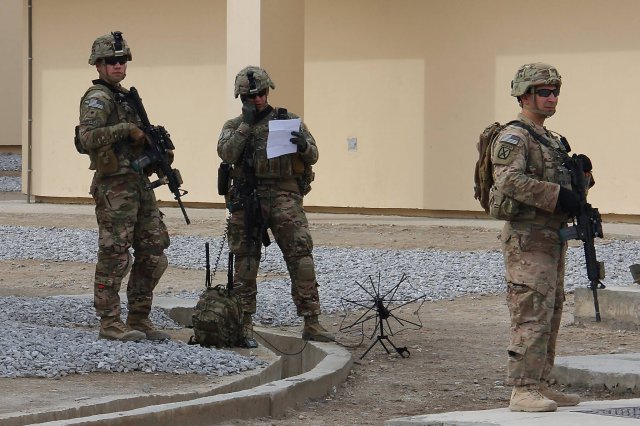Army’s New Radio Strategy Is Unrelenting Competition
Posted on

Army soldiers use the new “manpack” radio in Afghanistan
Yesterday, the Army awarded three companies a $12.7 billion, 10-year contract for over 60,000 manpack radios. But execs at General Dynamics, Harris, and Rockwell Collins shouldn’t pop champagne corks yet. The Army has radically changed how it buys radios in recent years so that what the “winning” companies have actually won, in essence, is the right to compete for the right to compete — with the possibility of more competitors coming in in the future.
Normally, the award of a full-rate production contract, like yesterday’s, means the winning company is golden. The competition is behind them. That’s not the case here.
Why? Modern military radios are essentially a commodity. They’re basically computers that can transmit and receive software-defined radio signals, much like a cellphone, and the explosion in commercial, civilian wireless computing means a lot more companies can compete.

Army soldier using the manpack radio at Network Integration Evaluation (NIE) exercise
The manpack award specifically is an Indefinite Quantity, Indefinite Delivery” (IQID) contract, which means the Army isn’t dividing up the 65,000 radios among the three winners in advance. Instead, it will allocate one lot at a time — and at least some of those lots, probably most, will be competed. Whichever company bids lowest gets to build the next X thousand radios.
What’s more, a single line in the Army’s press release warns that, “Ultimately, the Army intends to proceed with no more than two vendors into the fielding phase.” All three companies will produce 90 radios apiece for testing between now and early 2017. But before full-rate production begins in 2018, the Army plans to drop one contractor, leaving only two.
Even then, the two survivors won’t be safe. Not only will they have to worry about each other, the Army’s acquisition strategy includes “on-ramps” to allow other companies to qualify and compete.
It took a long time for the Army to get to this kind of acquisition. For years, the service was entangled with the massive and much-delayed Joint Tactical Radio System, or JTRS — the ill-omened pronunciation being “jitters.” The manpack radio still retains the prefix HMS, for “Handheld/Manpack/Small,” which was a division of the gigantic JTRS contract.
The JTRS program bogged down while commercial vendors met the urgent needs of warfighters in the field, using special procurement authorities for the Iraq and Afghanistan conflicts. Ultimately the Army gutted JTRS and went to the current contracting strategy — with its unrelenting competition that’s a model for other acquisition programs.
Subscribe to our newsletter
Promotions, new products and sales. Directly to your inbox.
